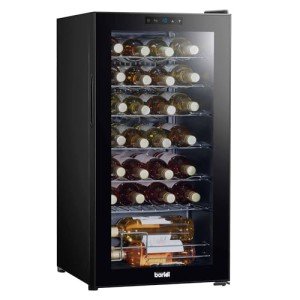A Relevant Rant About Fridge UK
The Comprehensive Guide to Refrigerators in the UK
Fridges are a vital device in every home, serving an important role in food preservation and security. The UK market offers a varied variety of fridge types, sizes, functions, and brands. This article aims to supply a thorough understanding of refrigerators readily available in the UK, including their features, energy efficiency, and factors to think about when buying.
Kinds Of Refrigerators Available in the UK
When looking for a refrigerator, it is very important to comprehend the various types available. Each type comes with its own set of functions and functions, accommodating different needs and preferences. The most typical kinds of refrigerators found in the UK include:
1. Top Freezer Refrigerators
- Description: The standard style, featuring the freezer compartment on top.
- Pros: More cost effective, spacious, simple access to fresh food.
- Cons: Limited freezer space, the top might be less convenient for bulk products.
2. Bottom Freezer Refrigerators
- Description: Freezer is situated at the bottom, allowing easier access to fresh food.
- Pros: Greater convenience, much better presence of fresh products.
- Cons: Usually more expensive, some may struggle with large frozen items.
3. Side-by-Side Refrigerators
- Description: Features 2 vertical compartments, one for the fridge and one for the freezer.
- Pros: Ample storage space, easy to access both frozen and fresh foods.
- Cons: Wider footprint, they may not fit in smaller kitchen areas.
4. French Door Refrigerators
- Description: Combines functions of bottom freezers and side-by-sides, with 2 doors for the fridge on top.
- Pros: Stylish design, roomy, and typically consists of sophisticated features.
- Cons: Higher cost point, aligns inadequately with smaller cooking area layouts.
5. Compact Refrigerators
- Description: Smaller designs created for restricted spaces.
- Pros: Ideal for little apartment or condos or offices, energy-efficient.
- Cons: Limited storage capacity, may do not have functions.
6. Integrated Refrigerators
- Description: Designed to blend flawlessly with kitchen cabinets.
- Pros: Custom fit, aesthetic appeal, increases home worth.
- Cons: Higher expense, may provide less flexibility in placement.
7. Smart Refrigerators
- Description: Equipped with Wi-Fi and smart technology functions.
- Pros: Advanced features like touch screens and internal cams.
- Cons: Expensive, more intricate to repair.
Refrigerator Type
Availability
Typical Price Range
Energy Efficiency
Leading Freezer
Moderate
₤ 300 – ₤ 600
Average
Bottom Freezer
High
₤ 400 – ₤ 800
Above Average
Side-by-Side
Easy
₤ 800 – ₤ 1500
Differs
French Door
High
₤ 800 – ₤ 2000
High
Compact
Restricted
₤ 200 – ₤ 500
Average
Integrated
Custom-made
₤ 1000 – ₤ 2500
High
Smart
Variable
₤ 1200+
High
Key Features to Consider
- Energy Efficiency: Look for models that are energy-efficient. In the UK, home appliances are rated from A (most efficient) to G (least effective). An A+ score and above can cause considerable energy cost savings.
- Capacity: Choose a fridge with adequate capacity for your family. A standard guideline is 100-200 liters per individual.
- Sound Level: Consider models that operate silently, specifically if the kitchen is near living spaces.
- Cooling Technology: Features like frost-free technology deserve the financial investment, as they lessen upkeep.
- Adjustable Shelves: Having adjustable racks improves the versatility to save bigger items.
- Temperature Control: Check for user friendly temperature controls and zones for various types of food.
- Design: Choose the style and color that matches your kitchen aesthetic, whether you choose a modern-day stainless steel appearance or a timeless retro surface.
Buying Tips
- Identify Your Needs: Consider your cooking routines, family size, and kitchen space.
- Set a Budget: Refrigerators been available in numerous rate ranges. Develop a budget before you start going shopping.
- Research Energy Ratings: Invest in energy-efficient models to minimize utility costs.
- Read Reviews: User experiences can offer insights into reliability and efficiency.
- Compare Brands: Some brand names are understood for their durability while others may use more ingenious functions.
Frequently Asked Questions (FAQs)
1. The length of time do refrigerators normally last?
- Refrigerators typically last between 10 to 20 years, depending on the brand and how well they are preserved.
2. Are there any upkeep ideas for lengthening the life of a refrigerator?
- Frequently clean the coils, examine the door seals, and periodically defrost if essential to maintain optimal efficiency.
3. What is the best size refrigerator for a household of four?
- For a family of 4, a refrigerator with a capacity of around 400-600 liters is generally enough.
4. Do I need to fret about energy usage when buying a refrigerator?
- Yes, energy consumption is very important. Look for systems with high energy effectiveness ratings to reduce regular monthly costs.
5. Should I pick a fridge with a water and ice dispenser?
- This feature can be hassle-free, particularly for households. Nevertheless, it may need more maintenance than standard designs.
Buying a refrigerator is a substantial decision for any household in the UK. With riacorners.top , each with its unique functions and benefits, it is vital to assess individual needs before deciding. By thinking about aspects such as energy performance, capability, and design aesthetics, consumers can choose a fridge that aligns well with their way of life, eventually boosting their kitchen area experience while protecting food quality and freshness.
